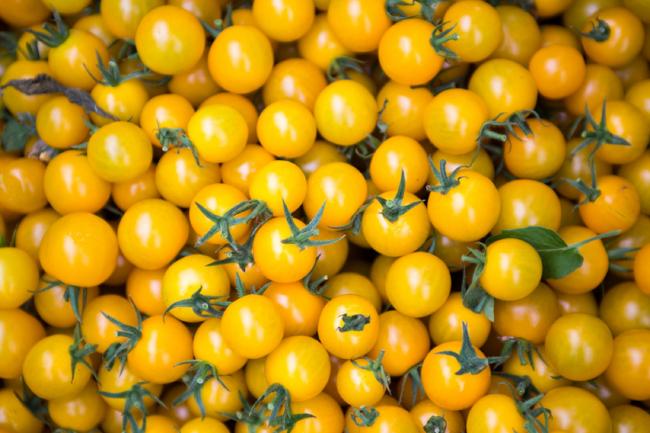Devolopment and Enhancement of Yellow Cherry Tomato Supply Chain

The project that is being implemented intends to support the development of the GIAGIU yellow tomato supply chain.
This chain will be characterized by the creation of high quality (traditional and innovative) productions that will be carried out in compliance with environmental and economic sustainability.
In particular, the initiative aims at achieving the following specific objectives:
- Identification of GIAGIU cherry tomato genotypes with particular agronomic and qualitative characteristics.
- Production of seed lots of the selected lines.
- Definition of a sustainable cultivation protocol.
- Development of new products to be marketed.
- Economic and market analysis of the new products.
Finally, the project aims to transfer the knowledge acquired to the greatest possible number of operators interested in the new supply chain.
This project requires a multidisciplinary methodological approach and the work group involved operates in accordance with this need.
In particular, the activities that have been planned are related to the genetic characterization of individual GIAGIU' cherry tomato plants identified as part of the mass selection activities and their multiplication in purity. At the same time, trial fields will be set up for the validation of a cultivation protocol (efficient use of water and fertilizers, monitoring and control of arthropods, pathogens and plant diseases) respectful of the environment. After the harvest, the tomato fruits will be processed to make new products and optimize existing tomato industry processes. The fresh tomato fruits and the processed product will be physically, chemically and organoleptically evaluated. The packaging techniques will also be revised in order to improve the product shelf-life.
Finally, an estimation of production cost and revenue will be carried out as well as a market analysis about potential consumers.
The cultivation of the GIAGIU ecotype will have an impact both in the area from which it was originally recognized and selected (Naples province), as well as in other horticultural producing areas of the Campania region (Caserta and Salerno provinces).
The regional agriculture is characterized by a high degree of fragmentation, by an environment and climate largely favourable for the cultivation of vegetables, as well as by high biodiversity that is present in the cultivation and promotion of many typical or local products. The data from the latest general census of agriculture indicate that on average the Campania farms (approximately 136,871) have a utilized agricultural area that does not exceed 4 hectares.
In many cases, the reduced farm size provides a stimulus to intensify the focus of production, above all, towards the commercial development of high quality “typical” products to increase farm revenues. A recent study has estimated that in the province of Naples the average production value for some farms is approximately 17,000.00euros/hectare, in comparison to the regional average of 6,556.00 euros/hectare. This demonstrates that by favouring forms of high quality agricultural products, which are appreciated by the market, it is possible to achieve high levels of profit that are indispensable for strengthening the economic conditions of agriculture in Campania. The distribution of the yellow cherry tomato GIAGIU fits in this logic as it extends the range of production alternatives available to farmers and the farms located in the provinces of Naples, Caserta and Salerno.
With the realization of this project, it is planned to introduce a series of innovations that will include the areas of genetics, agronomy and food technology.
In particular, in the first phase of the project, some genotypes of the GIAGIU cherry tomato with particular agronomic and qualitative characteristics will be selected, then subsequently multiplied to purity to provide the agricultural farms with seed and/or seedlings for use.
A cultivation protocol will be developed that will advise how to cultivate the yellow cherry tomato in the different areas in which it is expected to be produced. The results of the irrigation and fertilization optimization tests will also be transferred to the farms. Within the protocol, there will be a chapter dedicated to crop protection from pathogens to be achieved by using Trichoderma, while methods to control arthropods will be proposed through monitoring and eventual treatments based on the method of sexual confusion. The control of plant diseases and insect damage will take into account the influence of agronomic practices, the use of favourable associations, the management of the border flora and the biostimulating activity of Trichodermaspp. on the soil and on plant vigor.
Finally, innovative technologies capable of preserving the qualitative characteristics of the raw material will be proposed and new products will be obtained such as the "whole fruit sauce" which uses the entire fruit including the skins; in this manner, there will be a reduction in processing waste (reduced environmental impact) and a product with higher nutritional value (rich in phenols, ascorbic acid and lycopene).
| Titolo/Descrizione | Url | Tipologia |
|---|---|---|
|
Sito web del progetto
|
Sito web
|